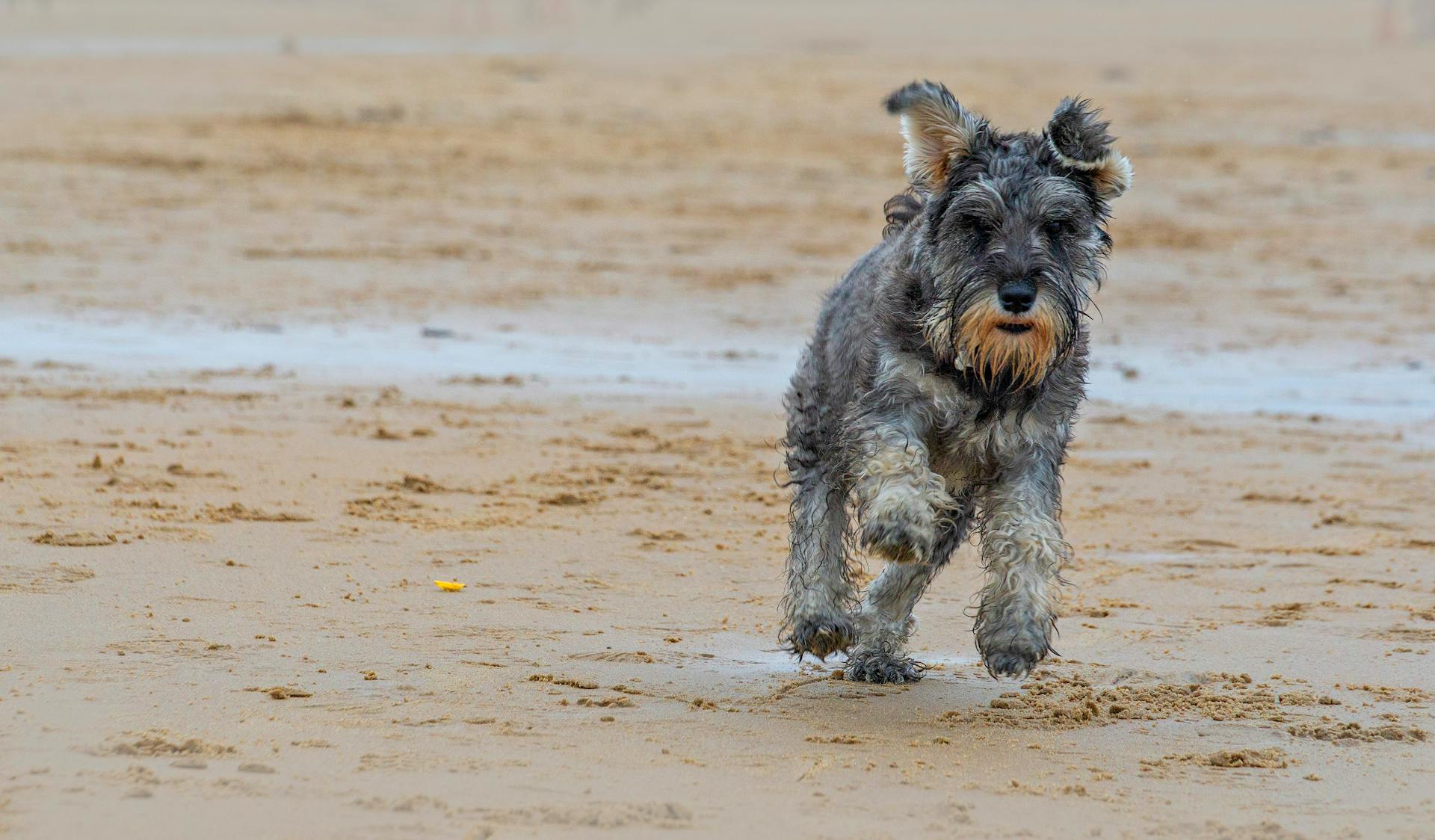
If your Schnauzer is shaking their head, it's likely due to ear mites or an ear infection, which can cause intense itching and discomfort.
Ear mites are tiny parasites that feed on the wax and oil in your Schnauzer's ears, leading to irritation and shaking.
A common sign of ear mites is a strong, unpleasant odor coming from the affected ear.
Ear infections, on the other hand, can be caused by bacteria or yeast, and may also lead to a strong odor or discharge.
Regular ear cleaning and checking can help prevent ear mites and infections, and is especially important for Schnauzers with floppy ears.
A different take: Dog Ear Odor
Dogs Shaking Heads
Dogs shake their heads for a variety of reasons, and it's not always a cause for concern.
Dogs may shake their heads as an effective way to expel irritants from their ears.
However, if your dog keeps shaking their head, it might be a sign of an underlying issue that needs attention.
If this caught your attention, see: Why Do Dachshunds Shake
Some common reasons for head shaking in dogs include inflammatory diseases, foreign objects that get lodged in the ear canal, and neurologic disorders that lead to head tremors.
These conditions can be easily treated by your veterinarian once diagnosed, but if left untreated, they can quickly develop into more serious problems.
Diagnosing and addressing the reason for a dog's head shaking is crucial to their long-term health, as it can potentially point to a serious problem.
Excessive head shaking can even lead to ruptured blood vessels within a dog's ear flap, which often requires surgery to correct.
Shaker syndrome is a congenital nerve defect that causes tremors in the head and whole body, and it's more common in certain breeds like the Maltese, Poodle, and West Highland Terrier.
If your dog is shaking their head due to shaker syndrome, the prognosis is excellent with treatment, and all signs of shaking can go away within a few weeks.
It's always a good idea to consult with your veterinarian to determine the cause of your dog's head shaking and develop a plan to address it.
Worth a look: Common Dog Diseases and Symptoms
Medical Conditions
Excessive head shaking in your Schnauzer can be a sign of an underlying medical condition. These conditions include inflammatory diseases, foreign objects in the ear canal, and neurologic disorders that lead to head tremors.
Ear infections are a common cause of head shaking, especially in adult dogs. They can cause itchiness, inflammation, and discharge, triggering a dog to shake its head. If you notice redness, discharge, or swelling in your Schnauzer's ear flap, it could be a sign of an ear infection.
Some diseases, such as vestibular disease, can also cause head shaking or tilting. This condition can cause a dog to feel dizzy and disoriented, leading to excessive head shaking.
Here's a list of potential causes of head shaking in dogs:
- Inflammatory diseases
- Foreign objects in the ear canal
- Neurologic disorders
- Ear infections
- Vestibular disease
These conditions can be diagnosed and treated by a veterinarian, and it's essential to address the underlying cause of the head shaking to prevent further complications, such as ruptured blood vessels in the ear flap.
Tick in Ear
Ticks can sometimes find their way into a dog's ear, causing them to shake their head. If a tick is on the shell of your dog's ear, you may be able to remove it yourself.
It's essential to check your dog's ears thoroughly after they've spent time outdoors, especially in areas known for their tick population. Removing ticks is much easier if you catch them before they bury up.
Ear Infections
Ear infections are a common health issue that causes excessive head shaking in dogs. They tend to get itchy and produce a significant amount of inflammation and discharge.
Redness, discharge, or swelling in the ear flap are clear signs of an ear infection. Lift up your dog's ear flap to check for these symptoms.
Ear mite infestations can cause similar symptoms, but they're not as common as yeast or bacterial infections in adult dogs.
Related reading: Female Dog Nipple Discharge
Neurological Disorders
Neurological disorders can be a concerning issue for dog owners. Some neurological conditions in dogs can cause shaking legs, making it difficult for them to walk or stand.
A veterinary neurologist should check dogs with shaking legs that make it hard to walk or stand. Various neurological conditions in both dogs and cats begin with shaking legs. Shaking legs can indicate weakness or disruption in communication from the spinal cord to the brain.
Twitching can also stem from extreme discomfort caused by a slipped disc or nerve problem. Shaker syndrome is a congenital nerve defect in the brain and spinal cord that causes tremors in the head and whole body.
Here are some breeds that are commonly affected by Shaker syndrome:
- Maltese
- Poodle
- West Highland Terriers
Degenerative myelopathy is another neurological disorder that can cause hind leg weakness and tremors. It involves a progressive thinning of the protective myelin sheath that provides insulation for painal nerves. This degeneration typically causes hind leg weakness and tremors, first in one rear leg, then in the other.
Degenerative myelopathy does not cause pain, but it can make some dogs so unstable that even a slight push from a standing position might knock them over, at which point they might find it exceptionally hard to get back up again.
Additional reading: Standard Poodle Back Leg Problems
Paralyzed Legs

Involuntary shaking and leg tremors are typical in paralyzed dogs. Muscle weakness and shaky legs go hand in hand.
As a dog's back legs weaken, they will likely experience muscle atrophy, nerve damage, and pain, all of which can cause leg tremors.
You may see your dog's legs shake or spasm periodically when their back legs are up in the wheelchair stirrups; this is normal. These tremors can mean that they are improving and possibly regaining their leg strength, but it does not necessarily mean your dog will walk again unassisted.
Additional reading: Hand Stripping Schnauzer
Symptoms and Behavior
Your schnauzer may shiver and tremble due to excitement, anxiety, being wet, or cold. This behavior can also be a sign of pain.
Certain breeds, including your schnauzer, are more prone to shivering than others. If the shaking is new or seems different from usual, it's worth investigating further.
If your schnauzer has eaten something toxic or has a serious illness, shivering could be a symptom. It's essential to consult your vet if you suspect something is wrong.
Do They Shake Their Heads?
Dogs may shake their heads to expel irritants from their ears. This can be a normal behavior for them, especially if it only happens occasionally.
If your dog is shaking their head frequently, it could be a sign of an underlying issue that needs attention. In some cases, headshaking can be a symptom of ear infections or other ear problems.
Dogs may use headshaking as an effective way to get rid of irritants, but it's always a good idea to check their ears for any signs of infection or discomfort.
Discover more: Mini Schnauzer Ears
Symptoms to Watch
If your dog is shaking their head, it's essential to watch for early signs of underlying issues. A common reason for head shaking in dogs is ear conditions, which can quickly develop into more serious problems if left untreated.
If your dog's shaking persists, it could be a sign of stress or anxiety. Look out for early signs such as yawning, licking their lips, or pulling back their ears. These behaviors can indicate that your dog is feeling anxious or overwhelmed.
On a similar theme: Dog Keeps Shaking Head after Grooming

Tremors in your dog's rear legs can be caused by various factors, including pain from degenerative joint problems or hip dysplasia. If your dog is experiencing chronic pain in their rear legs, they may exhibit tremors when trying to stand or walk.
Some breeds, such as German Shepherd Dogs, Collies, and Siberian Huskies, are more prone to degenerative myelopathy, a neurological disorder that causes hind leg weakness and tremors. Other breeds, like Maltese and West Highland White Terriers, may develop a condition called generalized tremor syndrome.
If your dog's shaking is sudden and seems to affect their entire body, it could be a sign of toxin ingestion, epilepsy, or another systemic issue that requires emergency veterinary care. On the other hand, if the tremors are confined to their rear legs and only occur when they try to move these limbs, it may be a sign of a non-emergency condition such as a chronic degenerative disorder.
Here are some hallmark symptoms that merit your attention:
- Sudden onset of shaking or quivering
- Shaking that affects the entire body
- Knuckling in the rear feet
- Hindquarters swaying while standing still
- Age-related complaints such as stiffness or lameness
- Breed-specific conditions such as generalized tremor syndrome
Frequently Asked Questions
Why does my schnauzer tremble?
Your schnauzer's trembling could be caused by a chronic illness, pain, cold, or nervousness. If you're concerned, it's essential to consult with a veterinarian to determine the underlying cause
What does it mean when a dog shivers when it's not cold?
If your dog shivers or trembles when it's not cold, it could be a sign of an underlying health issue, such as poisoning, kidney disease, or injury, and you should consult a vet immediately. Consult a vet if your dog's shivering is accompanied by other symptoms like diarrhea, vomiting, or limping.
Why does my dog shiver when lying down?
Dogs may shiver when lying down due to benign causes like dreaming or shaker syndrome, but it's essential to rule out other potential health issues
Featured Images: pexels.com


